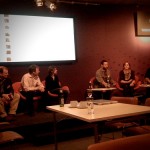I’m finding this post more difficult to write than normal, so I’ll try and keep it short – as short as it can be, given the issues involved.

This is me, camera in hand, with its little SXSW press tag on. Videographer – Photographer it says on it. It does make me scratch my head and set one eyebrow lower than the other, quizzically. I wouldn’t really describe myself as a journalist. Yes, I’ve been paid to write articles for a publications, and taken photos that have too, but I’ve spent my career at the other end of the process, ‘creating’ news. Either way, my perspective on the whole process has altered dramatically over the last year or so, and that change was crystalized this last week.
I’m not, by any stretch of the imagination, an activist. However, I do care about the conditions we live under. There’s nothing especially noble about that, it just makes good logical sense. Living under oppressive conditions isn’t conducive to happiness.
Almost a year ago was the first WordCamp (there’s another one soon). It threw together a spectrum of people, from technical geeks to traditional newspaper editors. We discussed and argued about the differences between blogging and “the press” and how new technology is changing the process for everyone – a light bulb started to go on in my head. Then, a few months ago I sat and listened to Clay Shirky talking about the role of journalists in the local press holding local politicians to account. The light bulb went on a little brighter. Journalism, even just the act of recording things, creates accountability.
You might have heard about Peter Gabriel’s “witness” charity. Yes, that Peter Gabriel. “See it. Film it. Change it.” is the organisation’s slogan. It is an international human rights organization that provides training and support to local groups to use video in their human rights advocacy campaigns. You can listen to Peter Gabriel’s moving talk about his reasons for setting up Witness in this TED talk (warning: adult themes).
Earlier this year, a piece of legislation was passed in the UK, which makes it illegal to take a photograph of a police officer, military personnel or member of the intelligence services, which “may be of use for terrorism”. That’s a very vague definition, and open to interpretation by the police – who under Home Secretary guidelines can “restrict photography in public places”. The law is part of the Counter Terrorism Act. In these days of Google’s streetview, it is hard to see how this law really adds to our safety. What it does do, is to restrict our ability to be witnesses. That became all the more important in the last week. That light bulb I mentioned is now flashing, red.
Ian Tomlinson is now a name that should be familiar to you. He died during the G20 protests. The Guardian ran a piece on his death as did the BBC. The Guardian posted an update today, which mentions something called “Kettling” – something I’d not heard of it until the G20 protests. It is a strategy used by the police to contain the protesters, which consists of surrounding the crowd and then not letting anyone go. No arrests. Just detainment. But it wasn’t just protesters. A number of passers by were held, without any charges, and with no access to toilet facilities or water, for hours. Take a peek behind the media head-lines and read Roo’s account of what happened to him On the ground at the G20 protests. I met Roo at HomeCamp, trust me when I say he isn’t a trouble maker. You can read Steve Lawson’s account on his blog: G20 protests – a change is gonna come.
The fact is, everyone needs to be accountable. Us. The police. Our politicians. Photography and videography has an important part to play in that process. If your mobile phone has a camera or a video recorder, you can be a witness. If you do that in London right now, you could be detained or arrested. That’s not right. Local photographer Simon Taylor has lodged a petition on the Number 10 site. It has been mentioned in the British Journal of Photography and you can go directly to it here. As Roo says: This is why we need more photographers at public events.






4 comments for “Why Photography Means More to Me Now”